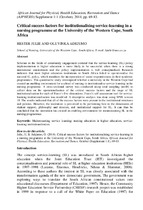Critical success factors for institutionalising service-learning in a nursing programme at the University of the Western Cape, South Africa
Abstract
Scholars in the fields of community engagement contend that the service-learning (SL) policy implementation in higher education is more likely to be successful when there is a strong institutional commitment and the policy implementation is well conceptualised. Research indicates that most higher education institutions in South Africa failed to operationalise the national SL policy, which mandates the incorporation of social responsiveness in their academic programmes. This quantitative study investigated whether a university in the Western Cape had created an enabling environment for a school of nursing to institutionalise service learning in the nursing programme. A cross-sectional survey was conducted using total sampling (n=48) to collect data on the operationalisation of the critical success factors and the stage of SL institutionalisation for each of Furco’s five dimensions. Furco’s self-assessment tool for service-learning institutionalisation was modified. A descriptive analysis was done using SPSS version 19. The results indicated that all of the success factors were present in the institutional structures and policies. However, the institution is perceived to be performing best in the dimensions of student support, philosophy and mission, and institutional support for SL. It can thus be concluded that the institution has created an enabling environment for mainstreaming SL in the nursing programmes.

